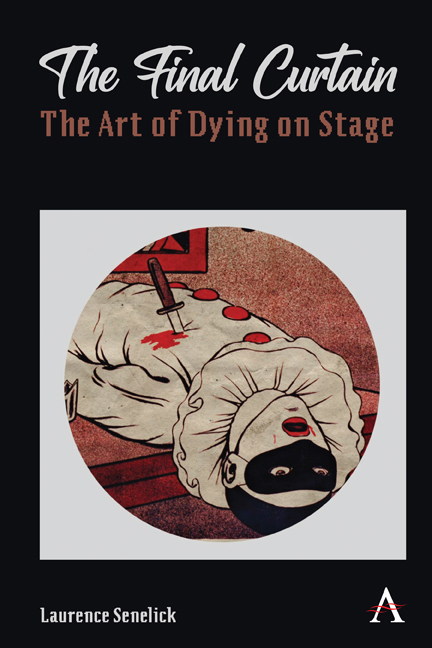Summary
“Is dying hard, Daddy?”
“No, I think it's pretty easy, Nick. It all depends.”
Ernest HemingwayThis is not a book about death. It is a book about dying or, more specifically, about the representation of dying in the theater. Its chief concern is how actors undertook to translate words and concepts into forms legible and significant to an audience. This cannot be discussed without attention to the ways in which playwrights wrote about death and attitudes toward death in their communities and cultures. Nevertheless, my emphasis is on the practice of acting.
In 1995 a British scholar noted that “the subject of death has loomed increasingly large in much academic discourse and yet literary representations of death have only very recently begun to receive critical attention.” Twentyfive years later this no longer holds true, but the bulk of this discourse is content to explore “literary representations,” in other words, texts. Those studies that deal with the performance of death limit themselves to modern and contemporary theater. Generally neglected has been what a performer of the past actually did on stage. There exist more historical studies of audience reception than of what the audiences were receiving.
The obstacles to reconstructing bygone performances are obvious. As Richard Grant White wrote as far back as 1872, an actor can be judged “only by the effect which he produces […] a result, the elements of which are his power on the one hand and the impressibility of his audience on the other.” Lest this be considered a retrograde or Victorian attitude, we find it reiterated on the eve of the Great War by an apostle of the New Stagecraft. Huntly Carter, while proselytizing for Reinhardt, Meyerhold, and the cinema, suggested that modern innovations in stage directing and design were necessary and natural substitutes for the “maximum intensity of acting.”
Acting that falls below this intensity needs to be supplemented; otherwise the spectator is robbed of his full effect. By full effect I mean one that converts the spectator for the time being, not into the actor or the producer [i.e., director], but into the author. […] I will try to circulate the truth that the theatre stands for one thing, and one thing only.
- Type
- Chapter
- Information
- The Final CurtainThe Art of Dying on Stage, pp. 1 - 12Publisher: Anthem PressPrint publication year: 2022



